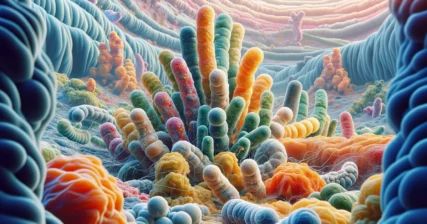Listen on: Apple Podcasts | Spotify
Like pharmaceuticals, nutritional supplements rarely cause only one effect on your physiology. Sometimes, supplements offer numerous health benefits and few, if any, side effects.
On the other hand, some supplements provide benefits for certain people while also causing undesirable side effects. Such is the case with many anti-androgen supplements.
You might have only read of the benefits of the supplements below. For example, you might think of saw palmetto and imagine a healthy prostate. But you don’t consider the fact that saw palmetto supports a healthy prostate, at least in part, by suppressing testosterone.
In this blog post, I cover some of the most well-known and research-supported anti-androgen supplements.
For certain people, these supplements provide significant health benefits. For others, they can cause unwanted side effects.

Feel Better Fast. Guaranteed.
Energy+, EDGE, and MentaBiotics make up the Happy Juice supplement stack, with ingredients clinically proven to:
- decrease anxiousness scores by 55%
- decrease irritability scores by 60%
- decrease fatigue by 64%
- decrease anger 54%
- decrease tension by 45%
- decrease confusion by 43%
- decrease overall distress by 49%
- increase good bacteria by 70%
- decrease negative mood by 105%
- increase positive mood by 211%
What is an anti-androgen?
An anti-androgen suppresses the production of testosterone or blocks its effects on its target cells.
Androgens are testosterone-related hormones. Though their levels are much higher in men than in women, women also need testosterone.
Excess testosterone contributes to:
- Prostate cancer
- Excessive sexual desire
- Acne
- Male pattern baldness
- Excessive female hairiness
- Polycystic ovary syndrome (PCOS)
To treat these conditions, doctors often prescribe anti-androgen pharmaceuticals or supplements.
Your hypothalamus, pituitary gland, and gonads all play roles in testosterone production. An anti-androgen may target any of the production steps, or it may block the effects of the androgen on target cells.
Though anti-androgenic drugs and supplements are useful in treating high testosterone, their testosterone-lowering effects can lead to problems in those who don’t have pre-existing, elevated testosterone.
If you have optimal, normal, or already-low testosterone, anti-androgen drugs and supplements may cause or exacerbate low testosterone symptoms.
Effects of anti-androgens
Long-term use of anti-androgens can lead to:
| System | Signs & Symptoms |
|---|---|
| Circulation | Hot flashes Sweats |
| Central nervous system | Insomnia Nervousness |
| Mood & cognition | Irritability & fatigue Reduced sense of wellbeing Reduced motivation Impaired short-term memory Depression / low self-esteem |
| Masculinity | Reduced vigor and physical strength |
| Sexuality | Reduced libido Erectile dysfunction Impaired orgasm Impaired ejaculation and reduced ejaculation volume |
| Physical features | Decreased muscle mass Abdominal obesity Loss of body hair Increased total body fat |
| Biochemistry | Decreased HDL, Increased LDL Osteoporosis Reduced red cell volume |
As you can see, if someone accidentally suppresses testosterone, it can lead to some extremely negative issues.
Read also: Irritable Male Syndrome, Andropause, and Reclaiming Your Manhood.
Anti-Androgenic Supplements
Because supplements can have numerous, unrelated effects on the body, you could take something for one benefit while also dealing with an undesirable side effect.
The following supplements have anti-androgenic effects.
Reishi (Ganodema lucidum)
Reishi has been used in Chinese medicine for thousands of years. As a medicinal mushroom, it is often recommended to support immune function and help combat viral and bacterial infections. It acts as an antioxidant and promotes normal blood sugar levels, as well as a healthy liver.
Reishi reduces levels of 5-alpha reductase, which then reduces the conversion of testosterone to DHT. Though excessive levels of DHT contribute to an enlarged prostate, acne, and male-pattern baldness, you need this potent form of testosterone.
Reducing DHT too much leads to the symptoms of low testosterone listed above.
Licorice (Glycyrrhiza glabra)
Licorice root also has a long history of use in Chinese medicine and has been used since before the Greek and Roman empires.
It has traditionally been used for digestive issues, respiratory infections, and tremors. It also acts as an antioxidant and supports normal inflammation levels.
Licorice may support the immune system in combating viruses and bacteria.
More recently, healthcare practitioners have recommended licorice to calm the mind and deal with occasional feelings of depression.
Licorice root contains three compounds that act as anti-androgen compounds.
First, it contains phytoestrogens, which mimic estrogen. Soy also contains phytoestrogens, which is why natural health practitioners are cautious about recommending it.
Second, it also contains weak steroids glycyrrhizin and glycyrrhetic acid, which both have anti-androgen effects.
So, suppose you use licorice for some of the respiratory, digestive, or cognitive benefits but find that you’re also displaying unwanted symptoms of low testosterone. In that case, you might need to find a different botanical to use.
Spearmint (Mentha spicata)
Spearmint is another source of antioxidants while also supporting normal inflammation levels and healthy blood sugar levels. It may also alleviate menstrual pain.
After drinking spearmint tea twice per day, women with PCOS experienced lower testosterone, luteinizing hormone, follicle-stimulating hormone, and estradiol.
In another study, women with hirsutism associated with PCOS drank spearmint twice daily for 30 days. Both their gonadotropins and androgen levels decreased.
In rats with PCOS, spearmint essential oil reduced body weight, testosterone levels, and ovarian cysts.
Though spearmint tea and spearmint essential oils contain different compounds, both seem to lower free testosterone without affecting total testosterone or DHEA.
I would not expect spearmint flavored gum or the inhalation of spearmint essential oils to have similar effects. However, I would recommend against the ingestion of spearmint tea or essential oils if you want to avoid lower testosterone levels.
Green Tea
Many people drink green tea as an alternative to coffee. It is rich in antioxidants, contains a moderate amount of caffeine, and may have a mild effect on your metabolic rate.
Animal research shows it may also help reduce occurrence of migraines.
Green tea, or more specifically, epigallocatechin-3-O-gallate (EGCG), plays an important role in supporting the immune system against viruses.
Regarding these biological properties, EGCG has been reported to possess a broad spectrum of antiviral activities against DNA viruses such as herpes simplex virus (HSV; Herpesviridae), adenovirus (Adenoviridae), human papilloma virus (HPV; Papovaviridae), and hepatitis B virus (HBV; Hepadnaviridae), and against (+)-RNA viruses such as hepatitis C virus (HCV; Flaviviridae), Zika virus (ZIKV; Flaviviridae), dengue virus (DENV; Flaviviridae), West Nile viruses (WNV; Flaviviridae), Chikungunya virus (CHIKV; Togaviridae), and Porcine Reproductive and Respiratory virus (PRRS; Atteriviridae), and (−)-RNA viruses such as human immunodeficiency virus (HIV; Retroviridae), Ebola virus (EBOV; Filoviridae) and influenza virus (Orthomyxoviridae).
Kaihatsu K, et al., Mechanism of Action of Epigallocatechin-3-O-gallate and Its Fatty Acid Esters
Though EGCG may be beneficial in the short-term to support your immune system in combatting viruses, long-term use may lead to insufficient androgen levels.
EGCG inhibits the conversion of testosterone to dihydrotestosterone (DHT). While excessively high levels of DHT can be problematic, you do need some of this potent version of testosterone for mental and physical health.
Saw Palmetto (Serona repens)
You’ll rarely come across a nutrition-related article about prostate health that doesn’t include a section on saw palmetto. Interestingly, existing research doesn’t provide strong support for its use in reducing prostate size.
Somehow, it remains one of the most popular supplements to support prostate health, though.
In my opinion, men should be cautious about supplementing with saw palmetto. It contains phytoesterols, which are potent anti-androgens.
The phytoesterols likely contribute to some of saw palmetto’s side effects, which include reduced libido, headache, and fatigue.
My Saw Palmetto Case Study
I’m often willing to try new supplements. Such was the case with a prostate health product I came across about a year ago.
Though I didn’t have symptoms of prostate issues, I figured I’d try out the supplement. At the time, I only knew of the often-promoted benefit of saw palmetto for men’s health.
Two weeks later, I told my wife that I felt miserable. I was tired, I had headaches each day, and my libido was non-existent. For several days, I told myself I just needed more sleep. That didn’t help.
Then, I remembered I’d recently started taking saw palmetto. I stopped that day, and two days later, I felt like myself again. Still unconvinced, I started retaking the supplement.
Sure enough, two days after that, I felt melancholic again.
Will every guy feel the same? Probably not. But my testosterone stays in the optimal range of 900-1200 ng/dL, so I’m not surprised that using saw palmetto contributed to symptoms of low testosterone for me.
If a doctor recommends saw palmetto to someone with an enlarged prostate, that’s one thing. If a guy decides to take saw palmetto as a preventative, that’s another.
I wouldn’t recommend taking saw palmetto if you don’t have a good reason to.
Protect Your Hormone Production
Maintaining optimal levels of testosterone, estrogen, growth hormone, thyroid, insulin, and other hormones is essential for long-term health and vitality.
Though a small percentage of women produce excessive testosterone, about 20% of women produce too little. In men, low testosterone is much more prevalent.
So, unless your doctor is treating you for excess androgens with one of the supplements above, you might be better off avoiding them as dietary supplements.

Feel Better Fast. Guaranteed.
Energy+, EDGE, and MentaBiotics make up the Happy Juice supplement stack, with ingredients clinically proven to:
- decrease anxiousness scores by 55%
- decrease irritability scores by 60%
- decrease fatigue by 64%
- decrease anger 54%
- decrease tension by 45%
- decrease confusion by 43%
- decrease overall distress by 49%
- increase good bacteria by 70%
- decrease negative mood by 105%
- increase positive mood by 211%
Photo by Simon Migaj on Unsplash



